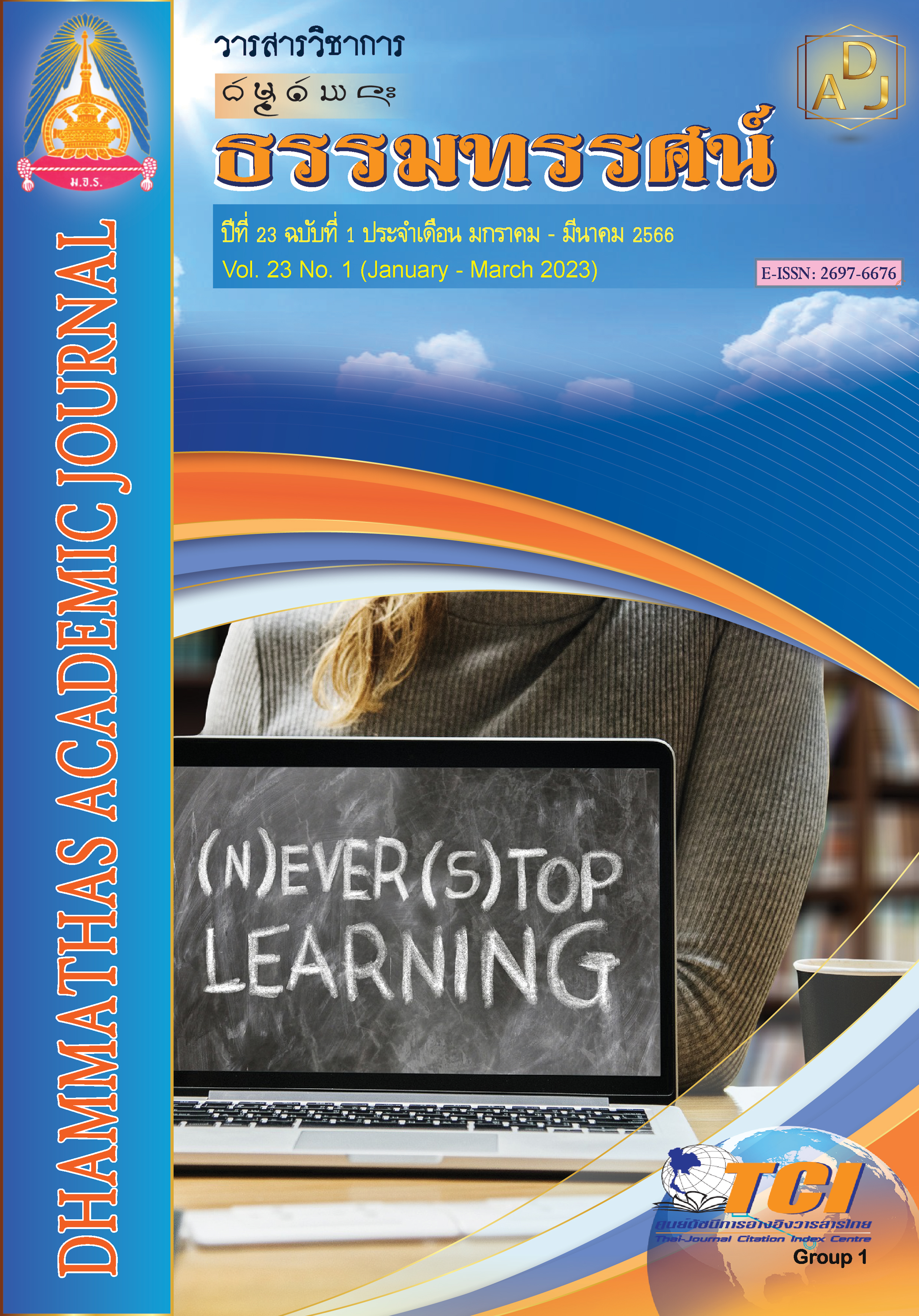Problems and Needs for Developing Research Competency in the Classroom of Teachers Practicing Professional Experience Rajabhat University in the Northeast
Main Article Content
Abstract
This research aims to study the problems and needs needed to develop research competency in the classroom of students practicing teacher professional experience and study the components of research competency The sample group consisted of 675 students for teaching professional experience by stratified random sampling, Faculty of Education, 11 Rajabhat Universities in the Northeastern region, and 6 experts. class and a questionnaire on the composition of research competency in the classroom of students practicing teacher professional experience. quantitative data analysis The questionnaire was analyzed with mean, standard deviation. and analyzed with Priority Needs Index (PNImodified) and analyze the content.
The results were found:
1. The results of assessment of problem conditions and needs of research competency in classroom of students practicing teaching professional experience by using Modified Priority Needs Index (PNImodified) method found that the competence with the highest need was Cognitive and research practical skills (PNImodified = 0.18), followed by Attitude (PNImodified = 0.13), respectively.
2. There are 3 components of research competency, namely 1) Cognitive aspects, 2) Research practical skills, and 3) Attitude.
Article Details

This work is licensed under a Creative Commons Attribution-NonCommercial-NoDerivatives 4.0 International License.
เพื่อให้เป็นไปตามกฎหมายลิขสิทธิ์ ผู้นิพนธ์ทุกท่านต้องลงลายมือชื่อในแบบฟอร์มใบมอบลิขสิทธิ์บทความ ให้แก่วารสารฯ พร้อมกับบทความต้นฉบับที่ได้แก้ไขครั้งสุดท้าย นอกจากนี้ ผู้นิพนธ์ทุกท่านต้องยืนยันว่าบทความ ต้นฉบับที่ส่งมาตีพิมพ์นั้น ได้ส่งมาตีพิมพ์เฉพาะในวารสาร วิชาการธรรม ทรรศน์ เพียงแห่งเดียวเท่านั้น หากมีการใช้ ภาพหรือตารางของผู้นิพนธ์อื่นที่ปรากฏในสิ่งตีพิมพ์อื่นมาแล้ว ผู้นิพนธ์ต้องขออนุญาตเจ้าของลิขสิทธิ์ก่อน พร้อมทั้ง แสดงหนังสือที่ได้รับการยินยอมต่อบรรณาธิการ ก่อนที่บทความจะได้รับการตีพิมพ์References
ไชยยศ ไพวิทยศิริธรรม และยุวรี ผลพันธิน. (2559). แนวทางการพัฒนาสมรรถนะด้านการวิจัยสำหรับนักศึกษาครู: การประเมินความต้องการจำเป็นแบบสมบูรณ์. Veridian E-Journal, Silpakorn University, 9(2), 230-246.
ทิศนา แขมมณี. (2557). ศาสตร์การสอน: องค์ความรู้เพื่อกระบวนการจัดการเรียนรู้ที่มีประสิทธิภาพ. กรุงเทพฯ: จุฬาลงกรณ์มหาวิทยาลัย.
นิลรัตน์ นวกิจไพฑูรย์. (2561). การพัฒนานวัตกรรมการเรียนรู้เพื่อส่งเสริมสมรรถนะการวิจัยสำหรับนักศึกษาสาขาการศึกษา มหาวิทยาลัยราชภัฏ. วารสารบัณฑิตศึกษา, 15(70), 65-77.
เนตรรุ้ง อยู่เจริญ, องอาจ นัยพัฒน์ และทวิกา ตั้งประภา. (2562). การประเมินความต้องการจำเป็นของสมรรถนะการทำวิจัยสถาบันสำหรับบุคลากรสายสนับสนุนวิชาการมหาวิทยาลัยราชภัฏ ในเขตกรุงเทพมหานคร: การวิจัยแบบผสมผสานวิธี. วารสารคณะศึกษาศาสตร์ มหาวิทยาลัยมหาสารคาม, 25(1), 143-160.
ประทินทิพย์ พรไชยยา. (2561). การพัฒนารูปแบบการเสริมสร้างสมรรถนะการวิจัยในชั้นเรียนของครูในสังกัดสำนักงานเขตพื้นที่การศึกษามัธยมศึกษา เขต 23. วารสารวิชาการสถาบันวิทยาการจัดการแห่งแปซิฟิก, 4(1), 25-43.
ปิยะปทีป แสงอุไร และปัญญฎา ประดิษฐบาทุกา. (2559). การพัฒนารูปแบบการส่งเสริมสมรรถนะวิจัยครูพลศึกษาในเขตกรุงเทพมหานคร. กรุงเทพฯ: สถาบันวิจัยและพัฒนา มหาวิทยาลัยราชภัฏจันทรเกษม.
ไพวัน ดวงพะจัน. (2561). รูปแบบการพัฒนาสมรรถนะการวิจัยในชั้นเรียนของครูระดับมัธยมศึกษาตอนปลาย สาธารณรัฐประชาธิปไตยประชาชนลาว. Veridian E-Journal, Silpakorn University, 11(1), 796-815.
ภัทราพร เกษสังข์ และคณะ. (2562). สมรรถนะและการประเมินความต้องการจำเป็นเพื่อพัฒนาวิชาชีพครูในศตวรรษที่ 21 ของครูกลุ่มสาระการเรียนรู้สังคมศึกษา ศาสนาและวัฒนธรรม จังหวัดเลย. วารสารวิจัยมหาวิทยาลัยเทคโนโลยีราชมงคลศรีวิชัย, 11(1), 132-145.
มัฮดี แวดรแม และคณะ. (2561). ความต้องการจำเป็นในการฝึกประสบการณ์วิชาชีพครู ในพื้นที่ 3 จังหวัดชายแดนภาคใต้ผ่านมุมมองของนักศึกษา ครู พี่เลี้ยง อาจารย์นิเทศ และผู้บริหารสถานศึกษา. วารสารศึกษาศาสตร์, 29(2), 80-87.
สำนักงานเลขาธิการสภาการศึกษา กระทรวงศึกษาธิการ. (2559). รายงานผลการศึกษาการพัฒนามาตรฐานการศึกษาของต่างประเทศ. นนทบุรี: เซ็นจูรี่ จำกัด.
สุวิมล ว่องวาณิช. (2560). การพัฒนาชุดการเรียนรู้เพื่อส่งเสริมทักษะการวิจัยในชั้นเรียนของนิสิตครู. (รายงานการวิจัย). กรุงเทพฯ: จุฬาลงกรณ์มหาวิทยาลัย.
_______. (2555). การวิจัยปฏิบัติการในชั้นเรียน. (พิมพ์ครั้งที่ 16). กรุงเทพฯ: จุฬาลงกรณ์มหาวิทยาลัย.
Davies, B. & L. Ellison. (1997). School Leadership for the 21 Century. London: London Rutledge.
McClelland, D. C. (1973). Testing for competence rather than for "intelligence". American psychologist, 28(1), 1-14.
Shermon, G. (2004). Competency Based HRM: A Strategic Resource for Competency Mapping Assessment and Development Centres. New Delhi, India: McGraw-Hill.

